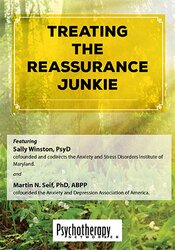Description
Some anxious clients have such an overpowering need to know they’re not making a mistake, missing something important, or thinking or feeling something wrong, that they constantly seek reassurance from therapists, family, friends, doctors, and the internet. Most compulsive reassurance seeking attempts to answer unanswerable questions, solve unsolvable problems, or know for sure something that’s unknowable. In fact, reassurance often works backwards with clients who suffer from generalized anxiety disorder or OCD, actually increasing distress. Rather than helping them to achieve greater certainty, the best approach is to teach them how to tolerate uncertainty.
CPD
CPD
- PESI Australia, in collaboration with PESI in the USA, offers quality online continuing professional development events from the leaders in the field at a standard recognized by professional associations including psychology, social work, occupational therapy, alcohol and drug professionals, counselling and psychotherapy. On completion of the training, a Professional Development Certificate is issued after the individual has answered and submitted a quiz and course evaluation. This online program is worth 2.0 hours CPD for points calculation by your association.
Faculty
Anxiety and Stress Disorders Institute of Maryland
Sally Winston, PsyD, cofounded and codirects the Anxiety and Stress Disorders Institute of Maryland. She’s the inaugural recipient of the national Jerilyn Ross Award of the Anxiety and Depression Association of America. She’s the coauthor of What Every Therapist Needs to Know about Anxiety Disorders and Unwanted Intrusive Thoughts.
Speaker Disclosures:
Financial: Dr. Sally Winston is the founder and executive director of the Anxiety and Stress Disorders Institute of Maryland and receives a speaking honorarium from the University of Maryland. She receives royalties as a published author. She has no relevant financial relationships with ineligible organizations.
Non-financial: Dr. Sally Winston is an author with Psychotherapy Networker. She is a lifetime member of the American Psychological Association, a fellow with the Maryland Psychological Association, and a founding clinical fellow of the Anxiety and Depression Association of America. She is also a member of the Association of Cognitive and Behavioral Therapies, the International OCD Foundation and the International Society for Traumatic Stress Studies.
Martin Seif, PhD, ABPP, cofounded the Anxiety and Depression Association of America. He’s associate director of the Anxiety and Phobia Treatment Center at White Plains Hospital and a faculty member of New York Presbyterian Hospital/Cornell Medical School. He’s the coauthor of What Every Therapist Needs to Know about Anxiety Disorders and Unwanted Intrusive Thoughts.
Speaker Disclosures:
Financial: Dr. Martin Seif maintains a private practice and has an employment relationship with New York Hospital. He is an author with New Harbinger and John Wiley & Sons and receives royalties. Dr. Seif serves as a consultant to Fly Without Fear, Inc. He receives a speaking honorarium and recording royalties from PESI, Inc. He has no relevant financial relationships with ineligible organizations.
Non-financial: Dr. Martin Seif has no relevant non-financial relationships.
Objectives
- Identify overt and subtle compulsive reassurance seeking in a clinical setting.
- Distinguish responses that reinforce obsessive worrying from those that reduce it.
- Implement evidence-informed treatment strategies which avoid inadvertent empty or unproductive reassurance.
- Apply strategies to increase tolerance for uncertainty.
- Describe how to increase mindful awareness of unproductive self-talk, which masquerades as self-comfort, rational refutation and problem-solving.
Outline
Recognize covert and subtle compulsive reassurance seeking in a clinical setting.
- We will describe productive and unproductive reassurance types, including hidden, implicit, deduced and empty subtypes as well as checking compulsions.
- We will illustrate how reassurance junkies present in the clinical setting, often as “neurotic”, or with generalized anxiety, depression, low self-esteem or poor confidence, needy or dependent with case vignettes.
Distinguish responses that reinforce obsessive worry from those that reduce it.
- We will show how reassurance can serve as negative reinforcement, driving the OCD cycle and maintaining obsessive worries.
- We will introduce a detailed classification system for reassurance traps, including Do No Harm, Always Do Right, Guarantees Forever and Banish All Doubts.
- We will discuss and define the three voices of the mind.
Implement evidence-informed treatment strategies which avoid inadvertent empty or unproductive reassurance.
- We will show how a meta-cognitive and acceptance-based approach interferes with the “addictive” cycle of reassurance seeking.
- We will demonstrate how to implement exposure and response prevention interventions which withdraw the patient from unproductive reassurance.
Apply strategies to increase tolerance for uncertainty.
- We will supply metaphors and stories that communicate the attitude of mindful acceptance that is an essential component of recovery.
- We will offer ways to withhold reassurance without sacrificing compassion.
Increase mindful awareness of unproductive self-talk which masquerades as self-comfort, rational refutation and problem-solving.
- We will show, using descriptions of internal dialogues, how many typical self-help and cognitive behavioural interventions can simply perpetuate the worry cycle by promoting paradoxical effort, entanglement with content and further reassurance-seeking.
Target Audience
- Psychologists
- Physicians
- Addiction Counselors
- Counselors
- Social Workers
- Marriage & Family Therapists
- Nurses
- Other Behavioral Health Professionals



